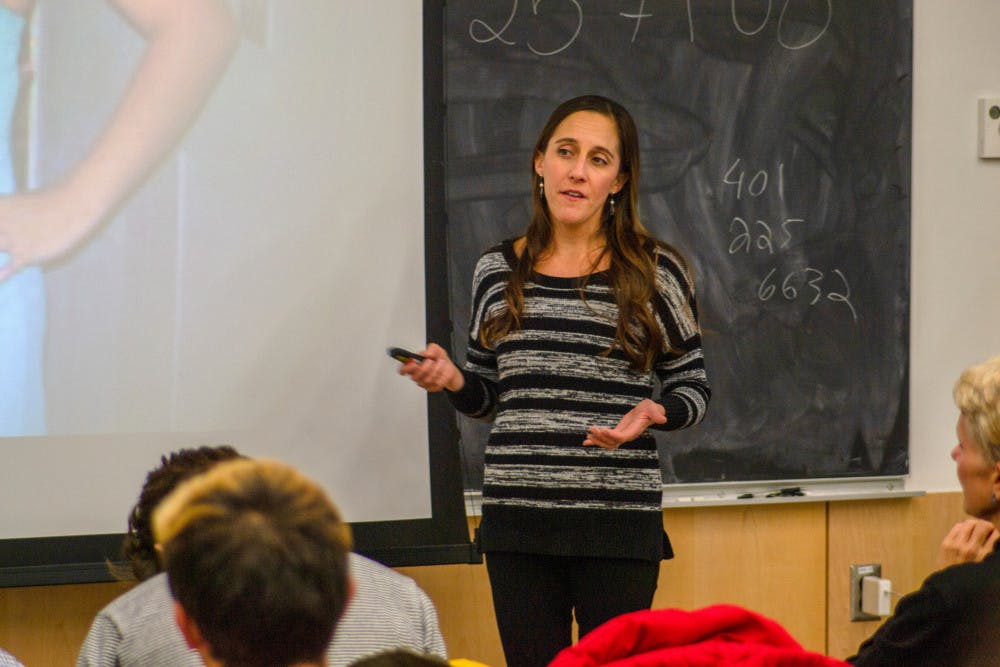On the morning of April 16, 2007, Lisa Hamp was in a computer class at Norris Hall on the campus of Virginia Tech when a gunman entered the building. Eleven minutes later, 33 people were dead.
“It happened so fast, but the moments really feel like forever,” Hamp said.
Hamp and her classmates survived after they barricaded their classroom door — which did not have a lock — with desks and chairs. They pushed the furniture against the entrance while the shooter tried to break through the door. This continued until the police stormed Norris Hall and the shooter took his own life.
Though the event left Hamp physically unharmed, she says that emotional wounds have persisted for over a decade. “On April 16, 2007, the shooting was over. But what I realized was that this day was the beginning of a very long recovery,” she said.
Hamp shared her experience of living with mental illness and post-traumatic stress disorder as well as the benefits of seeking counseling at an event hosted by Brown Active Minds last night. Hamp is now an advocate for Active Minds, a national nonprofit that supports mental health advocacy and education, said Molly Lavin ’21, the vice president of Active Minds.
Within 24 hours of the Virginia Tech shooting, Hamp was bombarded with police interviews, candlelight vigils and national media attention. Hamp said that talking about her experience with the police “felt good, but (it) burnt me out.”
After the shooting, Hamp did not consistently seek out counseling to understand her trauma. Hamp said she created a hierarchy of pain in her head, placing those who lost loved ones at the top, followed by the physically wounded. Hamp rationalized that she did not deserve resources or mental health help, since she thought that other individuals had experienced more pain than her.
Instead of turning to professional counseling, Hamp said she developed unhealthy patterns of coping with her trauma.
Hamp felt a complete loss of control over her own safety during the shooting, so she developed a “subconscious obsession” with controlling her surroundings afterward. “I looked for the closest thing I could control — the scale,” she said. Hamp used exercise and diet as coping mechanisms, which soon began to consume her daily routine. Hamp would go to the gym multiple times a day, and eventually the number on the scale began to control her mood, she said.
Around this time, Hamp said that while she was suffering, she still put on an outward show of strength and normalcy as she began graduate school at George Mason University and Johns Hopkins University.
Hamp’s unhealthy relationship with exercise and eating continued until she and her husband decided that they wanted to start a family. But due to her eating disorder, Hamp experienced fertility issues, which prompted her to finally see an eating disorder counselor, she said. “Going to counseling was like this lightbulb that changed everything.”
Through regularly attending therapy, Hamp grew comfortable in speaking with her counselor about her underlying trauma and her lack of strong self-care practices. Gradually, Hamp’s counselor became a trusted confidant. “I shared with my counselor things I hadn’t told my husband, my family and my close friends,” she said.
Hamp and her counselor eventually developed a set of healthier coping mechanisms to help her overcome her eating disorder. These practices, which include writing in her journal, going for walks and de-stressing with her dog, have allowed Hamp to begin the path to recovery and reconstruction, she said.
Along Hamp’s journey to recovery, “there were lots of tears as I worked through things that happened immediately following the shooting,” she said.
“But then I got some happy tears.” Three months after beginning her counseling, Hamp said her fertility issues resolved. She now has two children.





